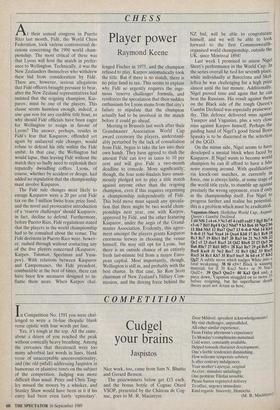CHESS
Player power
Raymond Keene
At their annual congress in Puerto Rico last month, Fide, the World Chess Federation, took various controversial de- cisions concerning the 1990 world cham- pionship. The most critical of these was that Lyons will host the match in prefer- ance to Wellington. Technically, it was the New Zealanders themselves who withdrew their bid from consideration by Fide. There are, however, serious allegations that Fide officers brought pressure to bear, after the New Zealand representatives had insisted that the reigning champion, Kas- parov, must be one of the players. This clause seems harmless enough, indeed, a sine qua non for any credible title bout, so why should Fide officials have been eager for Wellington to resign in favour of Lyons? The answer, perhaps, resides in Fide's fear that Kasparov, offended yet again by unilateral rule changes, would refuse to defend his title within the Fide ambit. In that case, the Wellington bid would lapse, thus leaving Fide without the match they so badly need to replenish their reputedly dwindling coffers. Lyons, of course, whether by accident or design, had added no stipulation that the championship must involve Kasparov.
The Fide rule changes most likely to enrage Kasparov were a 20 per cent Fide tax on the 3 million Swiss franc prize fund, and the novel and provocative introduction of a 'reserve challenger' should Kasparov, in fact, decline to defend. Furthermore, before Puerto Rico, Fide regulations stated that the players in the world championship had to be consulted about the venue. The Fide decisions in Puerto Rico were, howev- er, rushed through without contacting any of the five players concerned (Kasparov, Karpov, Timman, Speelman and Yusu- pov). With relations between Kasparov and Campomanes, the Fide president, combustible at the best of times, there can have been few measures designed to in- flame them more. When Karpov chal- lenged Fischer in 1975, and the champion refused to play, Karpov automatically took the title. But if there is no match, there is no prize fund to tax. This seems to explain why Fide so urgently requires the inge- nious 'reserve challenger' formula, and reinforces the speculation that their sudden enthusiasm for Lyons stems from that city's failure to stipulate that the champion actually had to be involved in the match before it could go ahead.
Meeting in Brussels last week after their Grandmaster Association World Cup award ceremony the players, understand- ably perturbed by the lack of consultation from Fide, began to take the law into their own hands. They have agreed to slash the amount Fide can levy in taxes to 10 per cent and will give Fide a two-month deadline to concede. More significantly; though, the four semi-finalists have unani- mously pledged not to play a title match against anyone other than the reigning champion, even if this requires organising a championship independently of Fide. This bold move must squash any specula- tion that there might be two world cham- pionships next year, one with Karpov, approved by Fide, and the other featuring Kasparov, under the aegis of the Grand- master Association. Evidently, this agree- ment amongst the players grants Kasparov enormous leeway in choosing the venue himself. He may still opt for Lyons, but there is an outside chance of an entirely fresh last-minute bid from a major Euro- pean capital. Most importantly, though, Wellington is still in, and probably with the best chance. In that case, Sir Ron Scott chairman of New Zealand's Hillary Com- mission, and the driving force behind the
NZ bid, will be able to congratulate himself, and we will be able to look forward to the first Commonwealth organised world championship, outside the UK, since Montreal 1894! Last week I promised to assess Nigel Short's performance in the World Cup. In the series overall he tied for seventh place, while individually at Barcelona and Skel- leftea he was challenging for a high pnze almost until the last minute. Additionally, Nigel proved time and again that he can beat the Russians. His result against them on the Black side of the tough Queen's
Gambit Declined was especially praisewor- thy. This defence delivered wins against Yusupov and Vaganian, plus a very close miss against Karpov himself. Perhaps the guiding hand of Nigel's good friend Bons Spassky is to be discerned in the selection of the QGD.
-On the minus side, Nigel seems to have developed a mental block when faced by Kasparov. If Nigel wants to become world champion he can ill afford to have a bete noire roaming around. With qualification via knock-out matches, as currently HI force, one is always liable, at some stage of the world title cycle, to stumble up against precisely the wrong opponent, even if only in the championship itself. For Nigel to progress further and realise his potential, this is a problem which must be eradicated.
Vaganian-Short: Skelleftea World Cup, August: Queen's Gambit Declined. 1 d4 Nf6 2 c4 e6 3 Nc3 d5 4 cxd5 exd5 5 Bg5 Be7 6 e3 c6 7 Bd3 Bg4 8 Qc2 Nbd7 9 h3 Be6 10 Nge2 h6 11 Bh4 Nh5 12 Bxe7 Qxe7 13 0-0-0 Nb6 14 Kbl 0-0-0 15 Na4 Nxa4 16 Qxa4 Kb8 17 Rd l Rc8 18 Rc7 19 Rhcl Bd7 20 Ra3 b6 21 Nc3 Nf6 22 Qc2 c5 23 clxc5 Rxr5 24 Qd2 Rhc8 25 13 Qe5 26 Ba6 R8c7 27 Rdl Bf5+ 28 Kal Re7 29 g4 Bc8 30 Bxc8 Kxc8 31 Ne2 Rec7 32 Rc3 Qh2 33 Rx6 Rxc5 34 Rd Kb7 35 Rxc5 bxc5 36 b4 c4 37 Kb2 Qg2! A subtle move which nudges White into a fatal weakening. 38 f4 c3+! Black is winnin material, for if 39 ICxc3 Ne4+ or 39 Nx Qxd2+. 39 Qxc3 Qxe2+ 40 Ka3 Qc4 and, a piece down, Vaganian struggled on to move 53 before resigning, but his superfluous death throes need not detain us here.


































































 Previous page
Previous page